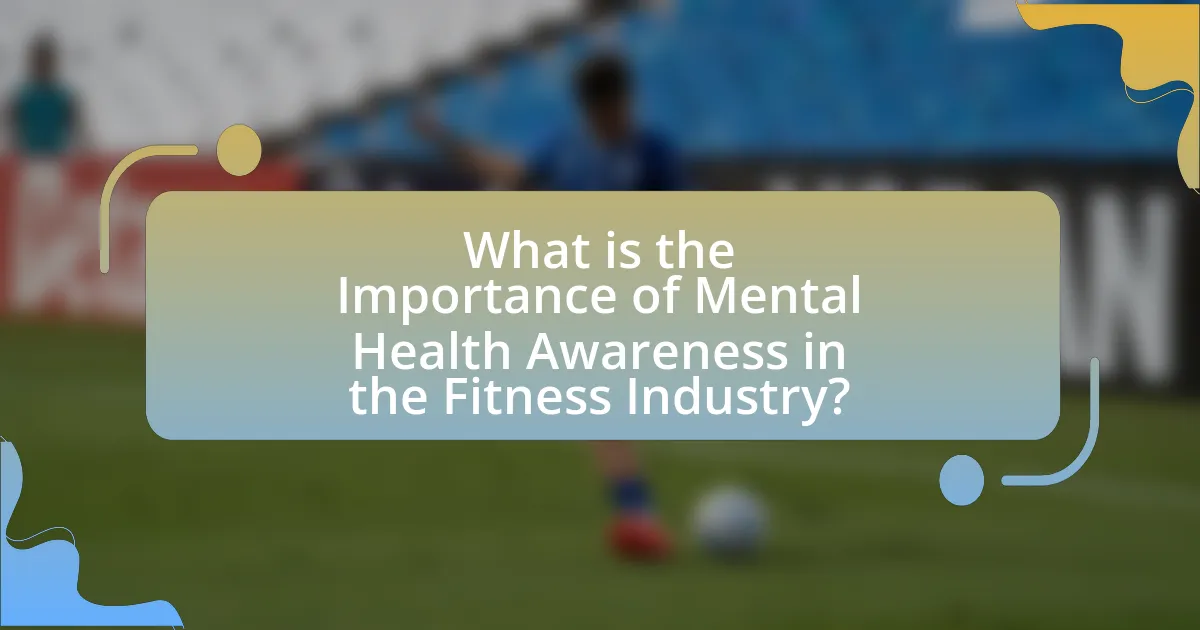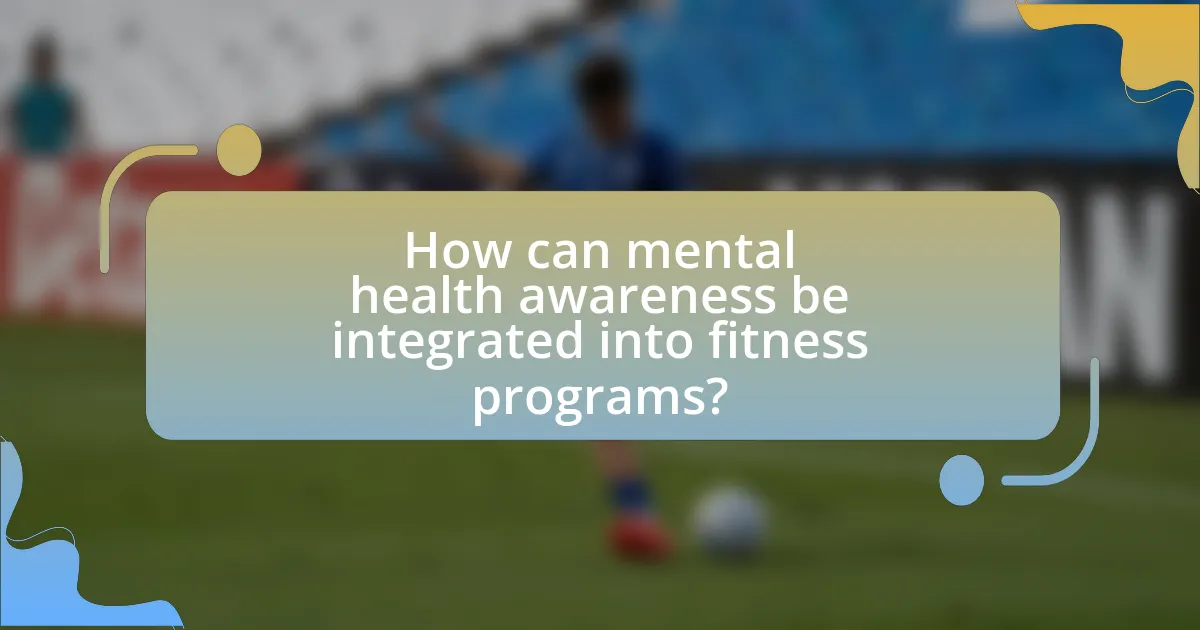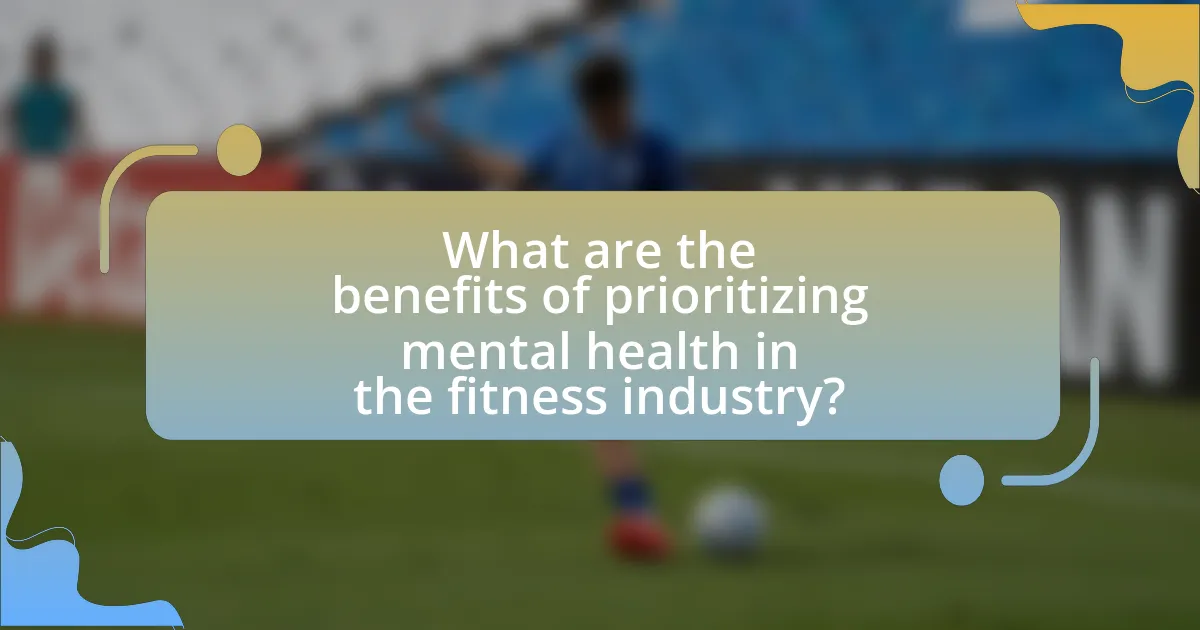The article emphasizes the critical role of mental health awareness within the fitness industry, highlighting the interconnectedness of physical and mental well-being. It discusses the importance of fitness professionals being equipped to recognize and address mental health issues, as neglecting these can lead to decreased motivation, increased injury risk, and burnout. The article outlines strategies for integrating mental health awareness into fitness programs, including training staff, fostering supportive environments, and utilizing group classes to enhance community support. Additionally, it presents evidence linking mental health to fitness success and client retention, underscoring the need for ongoing education and resources for fitness professionals to effectively promote mental well-being.

What is the Importance of Mental Health Awareness in the Fitness Industry?
Mental health awareness is crucial in the fitness industry because it promotes holistic well-being, recognizing that physical health is interconnected with mental health. The fitness industry often emphasizes physical performance and aesthetics, which can lead to neglecting mental health issues such as anxiety, depression, and body image concerns. Research indicates that approximately 1 in 5 adults experience mental illness, highlighting the need for fitness professionals to be equipped to address these issues. By fostering an environment that prioritizes mental health, fitness facilities can enhance client retention, improve overall satisfaction, and contribute to a more supportive community. Furthermore, studies show that regular physical activity can significantly reduce symptoms of mental health disorders, reinforcing the importance of integrating mental health awareness into fitness programs.
Why is mental health awareness crucial for fitness professionals?
Mental health awareness is crucial for fitness professionals because it enables them to recognize and address the psychological well-being of their clients, which directly impacts physical performance and overall health. Research indicates that mental health issues, such as anxiety and depression, can significantly hinder an individual’s ability to engage in physical activity and adhere to fitness programs. For instance, a study published in the Journal of Clinical Psychology found that individuals with depression are 30% less likely to participate in regular exercise compared to those without mental health challenges. By being aware of mental health, fitness professionals can create supportive environments, tailor programs to meet clients’ emotional needs, and promote holistic wellness, ultimately leading to better outcomes for both mental and physical health.
What role do fitness professionals play in promoting mental health?
Fitness professionals play a crucial role in promoting mental health by providing support, guidance, and a structured environment that encourages physical activity, which is linked to improved mental well-being. Research indicates that regular exercise can reduce symptoms of anxiety and depression, enhance mood, and boost self-esteem. For instance, a study published in the Journal of Clinical Psychiatry found that engaging in physical activity can lead to a significant reduction in depressive symptoms, highlighting the importance of fitness professionals in facilitating these activities. By creating inclusive and motivating fitness programs, professionals help individuals develop healthy habits that contribute to better mental health outcomes.
How can fitness professionals identify mental health issues in clients?
Fitness professionals can identify mental health issues in clients by observing behavioral changes, communication patterns, and emotional responses during sessions. For instance, signs such as withdrawal from social interactions, changes in motivation, or increased anxiety can indicate underlying mental health concerns. Research indicates that approximately 1 in 5 adults experience mental illness, highlighting the importance of awareness in fitness settings. By employing screening tools like questionnaires or informal check-ins, fitness professionals can facilitate discussions about mental health, enabling early identification and appropriate referrals to mental health services when necessary.
What are the potential impacts of neglecting mental health in fitness?
Neglecting mental health in fitness can lead to decreased motivation, increased risk of injury, and higher rates of burnout. When individuals overlook their mental well-being, they may struggle to maintain a consistent workout routine, resulting in diminished physical fitness outcomes. Research indicates that mental health issues, such as anxiety and depression, can significantly impair physical performance and recovery (American Psychological Association, 2020). Furthermore, neglecting mental health can contribute to a negative relationship with exercise, where individuals may view fitness as a chore rather than a source of enjoyment, ultimately leading to disengagement from physical activity.
How does poor mental health affect physical performance?
Poor mental health significantly impairs physical performance by reducing motivation, focus, and energy levels. Individuals experiencing conditions such as depression or anxiety often report decreased physical activity due to fatigue and lack of interest, which can lead to diminished strength, endurance, and overall fitness. Research indicates that mental health issues can alter physiological responses, such as increased heart rate and muscle tension, which negatively impact athletic performance. A study published in the Journal of Clinical Psychology found that individuals with anxiety disorders exhibited lower physical performance levels compared to those without such disorders, highlighting the direct correlation between mental and physical health.
What are the long-term consequences of ignoring mental health in fitness?
Ignoring mental health in fitness can lead to severe long-term consequences, including increased risk of chronic stress, anxiety disorders, and depression. Research indicates that individuals who neglect their mental well-being while pursuing fitness goals may experience burnout, which can diminish motivation and lead to a decline in physical health. A study published in the Journal of Health Psychology found that individuals with poor mental health are less likely to engage in regular physical activity, creating a cycle of inactivity and worsening mental health. Furthermore, neglecting mental health can result in social isolation, as individuals may withdraw from social interactions related to fitness, ultimately impacting their overall quality of life.

How can mental health awareness be integrated into fitness programs?
Mental health awareness can be integrated into fitness programs by incorporating mental wellness education, offering supportive environments, and training staff on mental health issues. Fitness programs can include workshops that educate participants about the connection between physical activity and mental health, emphasizing how exercise can alleviate symptoms of anxiety and depression. Additionally, creating a supportive community within fitness settings encourages open discussions about mental health, fostering a culture of acceptance and understanding. Training staff to recognize signs of mental health struggles enables them to provide appropriate support and resources, enhancing the overall effectiveness of the fitness program in promoting mental well-being.
What strategies can fitness facilities implement to promote mental health?
Fitness facilities can implement strategies such as offering mental health workshops, providing access to mental health professionals, and creating supportive community environments to promote mental health. These initiatives can help members understand the connection between physical activity and mental well-being, as studies show that regular exercise can reduce symptoms of anxiety and depression. For instance, a study published in the Journal of Clinical Psychiatry found that exercise can be as effective as medication for some individuals with depression. Additionally, creating group classes that foster social interaction can enhance feelings of belonging and reduce isolation, which is crucial for mental health.
How can group classes foster a supportive environment for mental health?
Group classes can foster a supportive environment for mental health by promoting social interaction and community building among participants. This social aspect helps reduce feelings of isolation, which is often linked to mental health issues. Research indicates that social support is crucial for mental well-being; for instance, a study published in the Journal of Health Psychology found that individuals who engage in group activities report higher levels of happiness and lower levels of stress. Additionally, group classes often create a sense of accountability and motivation, encouraging individuals to attend regularly and engage in physical activity, both of which are beneficial for mental health.
What role does communication play in mental health awareness in fitness?
Communication is essential for promoting mental health awareness in fitness by facilitating open discussions about mental well-being among trainers, clients, and the community. Effective communication helps to destigmatize mental health issues, encouraging individuals to seek help and support. Studies show that fitness environments that prioritize communication about mental health can lead to increased awareness and understanding, ultimately fostering a supportive atmosphere. For instance, a survey by the Mental Health Foundation found that 70% of people believe that discussing mental health in fitness settings can improve overall well-being. This highlights the critical role communication plays in enhancing mental health awareness within the fitness industry.
How can trainers support clients’ mental health during workouts?
Trainers can support clients’ mental health during workouts by fostering a positive and inclusive environment that encourages open communication. This approach allows clients to express their feelings and concerns, which can significantly reduce anxiety and improve overall mental well-being. Research indicates that physical activity can enhance mood and reduce symptoms of depression, with a study published in the Journal of Clinical Psychiatry showing that regular exercise can be as effective as medication for some individuals with depression. By incorporating mental health awareness into their training sessions, trainers can help clients set realistic goals, celebrate achievements, and provide positive reinforcement, all of which contribute to a healthier mindset.
What techniques can trainers use to encourage mental well-being?
Trainers can use techniques such as mindfulness practices, positive reinforcement, and open communication to encourage mental well-being. Mindfulness practices, including meditation and breathing exercises, help clients reduce stress and enhance focus, which has been shown to improve overall mental health. Positive reinforcement, such as celebrating small achievements, boosts clients’ self-esteem and motivation, contributing to a healthier mindset. Open communication fosters a supportive environment where clients feel safe discussing their mental health challenges, leading to better emotional support and guidance. Research indicates that these techniques can significantly enhance mental well-being, as evidenced by studies showing that mindfulness can reduce anxiety and improve mood.
How can trainers create personalized fitness plans that consider mental health?
Trainers can create personalized fitness plans that consider mental health by conducting thorough assessments of clients’ mental well-being alongside their physical fitness levels. This approach includes using standardized questionnaires to evaluate stress, anxiety, and mood, which allows trainers to tailor workouts that not only enhance physical health but also promote mental resilience. Research indicates that exercise can significantly reduce symptoms of anxiety and depression, with a study published in the Journal of Clinical Psychiatry showing that regular physical activity can lead to a 20-30% reduction in depressive symptoms. By integrating mental health considerations into fitness plans, trainers can foster a holistic approach that supports both physical and psychological well-being.

What are the benefits of prioritizing mental health in the fitness industry?
Prioritizing mental health in the fitness industry enhances overall well-being and performance. By focusing on mental health, fitness professionals can create supportive environments that reduce stress, anxiety, and depression among clients. Research indicates that regular physical activity positively impacts mental health, with a study published in the Journal of Clinical Psychiatry showing that exercise can reduce symptoms of anxiety and depression by up to 50%. Additionally, prioritizing mental health fosters stronger client-trainer relationships, leading to increased motivation and adherence to fitness programs. This holistic approach not only improves individual outcomes but also contributes to a more positive and inclusive fitness culture.
How does mental health awareness enhance client retention and satisfaction?
Mental health awareness enhances client retention and satisfaction by fostering a supportive environment that addresses clients’ emotional and psychological needs. When fitness professionals prioritize mental health, clients feel understood and valued, leading to increased loyalty and commitment to their fitness journey. Research indicates that 70% of clients report higher satisfaction levels when their trainers demonstrate empathy and understanding of mental health issues. This connection not only improves client engagement but also encourages consistent attendance and participation, ultimately resulting in better retention rates.
What evidence supports the link between mental health and fitness success?
Research indicates a strong link between mental health and fitness success, with studies showing that individuals who engage in regular physical activity experience improved mood and reduced symptoms of anxiety and depression. For instance, a meta-analysis published in the journal “Health Psychology Review” found that exercise significantly enhances mental well-being, leading to better adherence to fitness programs. Additionally, a study by the American Psychological Association revealed that individuals with higher levels of psychological resilience are more likely to achieve their fitness goals, demonstrating that mental health directly influences motivation and persistence in fitness endeavors.
How can mental health awareness improve the overall fitness community?
Mental health awareness can significantly improve the overall fitness community by fostering a supportive environment that encourages individuals to prioritize both physical and mental well-being. When fitness professionals and community members recognize the importance of mental health, they can create programs and initiatives that address mental wellness alongside physical training. Research indicates that individuals who engage in regular physical activity experience reduced symptoms of anxiety and depression, highlighting the interconnectedness of mental and physical health. For instance, a study published in the Journal of Clinical Psychiatry found that exercise can be as effective as medication for some individuals with depression. By integrating mental health awareness into fitness programs, the community can promote holistic health, reduce stigma, and encourage individuals to seek help when needed, ultimately leading to a more inclusive and supportive fitness culture.
What resources are available for fitness professionals to enhance mental health awareness?
Fitness professionals can enhance mental health awareness through various resources, including training programs, workshops, and online courses specifically focused on mental health. Organizations such as the National Academy of Sports Medicine (NASM) offer courses like “Mental Health Awareness for Fitness Professionals,” which educates trainers on recognizing mental health issues and providing appropriate support. Additionally, the American Psychological Association (APA) provides guidelines and resources that fitness professionals can access to better understand the psychological aspects of fitness and well-being. Research indicates that integrating mental health education into fitness training can improve client outcomes, as highlighted in studies published in the Journal of Clinical Psychology, which emphasize the correlation between physical activity and mental health benefits.
What training programs focus on mental health in the fitness industry?
Training programs that focus on mental health in the fitness industry include the Mental Health First Aid program, which educates fitness professionals on recognizing and responding to mental health issues, and the National Academy of Sports Medicine’s (NASM) Mental Health and Fitness course, which integrates mental wellness strategies into fitness training. These programs are designed to equip trainers with the skills to support clients’ mental well-being, emphasizing the connection between physical fitness and mental health. Research indicates that physical activity can significantly reduce symptoms of anxiety and depression, reinforcing the importance of mental health training in fitness.
How can fitness professionals stay informed about mental health issues?
Fitness professionals can stay informed about mental health issues by engaging in continuous education through workshops, seminars, and online courses focused on mental health. Research indicates that ongoing training enhances knowledge and awareness, enabling fitness professionals to better support clients. For instance, the National Alliance on Mental Illness (NAMI) offers resources and training programs specifically designed for fitness professionals, emphasizing the integration of mental health awareness into fitness practices. Additionally, subscribing to reputable journals and following mental health organizations on social media can provide updates on the latest research and trends in mental health, further equipping fitness professionals with essential information to address mental health concerns effectively.
What practical steps can fitness professionals take to promote mental health awareness?
Fitness professionals can promote mental health awareness by integrating mental health education into their training programs. This can include providing resources on mental health topics, facilitating workshops that focus on the connection between physical fitness and mental well-being, and encouraging open discussions about mental health among clients. Research indicates that physical activity can significantly reduce symptoms of anxiety and depression, highlighting the importance of addressing mental health in fitness settings. By creating a supportive environment and offering mental health resources, fitness professionals can effectively raise awareness and contribute to their clients’ overall well-being.





